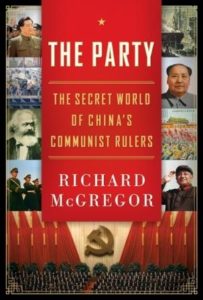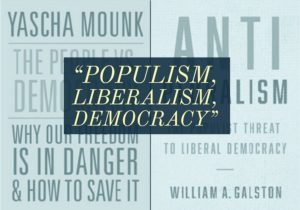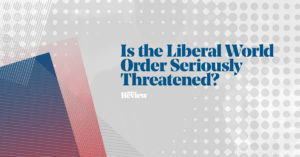 In our work on hybrid or competitive authoritarian regimes, we show how democracy can be fundamentally compromised even without obvious civil liberties violations or electoral fraud, say analysts Lucan Ahmad Way and Steven Levitsky.
In our work on hybrid or competitive authoritarian regimes, we show how democracy can be fundamentally compromised even without obvious civil liberties violations or electoral fraud, say analysts Lucan Ahmad Way and Steven Levitsky.
Leaders can create an “uneven playing field” by using administrative powers to strengthen their party and systematically deny the opposition access to crucial resources, media or state institutions. These autocrats submit to meaningful multiparty elections — but engage in serious democratic abuse, they write for Monkey Cage:
In any democracy, elected officials have advantages over their challengers, including an easier time attracting media coverage and business support, because the government can deliver resources and policy benefits. But an uneven playing field means leaders use those advantages in ways that profoundly impair the opposition’s ability to compete.
A signature theme of the new year is the possibility of a malign confrontation between the world’s greatly enhanced capacity for electronic surveillance and the weakening of democratic control. The antidote to that risk is the democratic spirit and civil freedoms – both of which are suffering world-wide. These are not dead, but they are unwell, at times untended, notes John Lloyd, co-founder of Oxford University’s Reuters Institute for the Study of Journalism:
 The world’s two most populous states, China and India –together, around 37 percent of the global population – have rolled out nationwide digital systems of monitoring and classification….China’s “social credit system” combines face, voice and fingerprint recognition technology with monitoring of public and private behavior such as internet use, educational choices and social networks.. The official Party description of the system claims that it “will allow the trustworthy to roam freely under heaven while making it hard for the discredited to take a single step.” …India’s Aadhaar (“foundation” in Hindi) national identity card technology aims to be as comprehensive as the Chinese model, but is not designed to be as intrusive.
The world’s two most populous states, China and India –together, around 37 percent of the global population – have rolled out nationwide digital systems of monitoring and classification….China’s “social credit system” combines face, voice and fingerprint recognition technology with monitoring of public and private behavior such as internet use, educational choices and social networks.. The official Party description of the system claims that it “will allow the trustworthy to roam freely under heaven while making it hard for the discredited to take a single step.” …India’s Aadhaar (“foundation” in Hindi) national identity card technology aims to be as comprehensive as the Chinese model, but is not designed to be as intrusive.
“Mature democracies, whose publics, courts, media outlets and institutions of civil society remain free and vigilant, can – with some exceptions and accidents – ensure that technological use is consonant with the need to counter threats, or secure efficiency in the public sphere,” Lloyd adds. “The predictions of democratic failure in the face of authoritarian power will come true only if publics allow it. 2019 cannot be the year of more control, but of the revival of the liberal spirit.”
Has the west experienced a shift from exporting democracy to importing illiberalism, as some analysts suggest?
 Yet there are few signs democracy itself is at risk in these countries, or in others where democratic institutions are long-established, notes Brookings analyst William Galston. Although democracy, like every other form of government, is judged by results, dysfunction remains below the levels that would spark a systemic crisis.
Yet there are few signs democracy itself is at risk in these countries, or in others where democratic institutions are long-established, notes Brookings analyst William Galston. Although democracy, like every other form of government, is judged by results, dysfunction remains below the levels that would spark a systemic crisis.
Democracy remains on the defensive, and 2019 will be a time of testing, he writes for The Wall Street Journal. But in 2019 there are grounds for hope that the democratic recession may be slowing.
Democracy is unambiguously in retreat from some countries, such as Hungary. That is not the situation in South Asia, notes Paul Staniland, Associate Professor of Political Science at the University of Chicago. There the contradictory nature of democracy’s advance shows, above all, the importance of vigilance. Those who defend liberal democracy must do so continually, pushing back against rights-denying ideological projects, politicians who undermine institutions, and institutions that seek to escape accountability, he writes for Foreign Affairs.
 In 2019, the World Movement for Democracy plans to leverage the outcomes of its past year’s activities in the following ways:
In 2019, the World Movement for Democracy plans to leverage the outcomes of its past year’s activities in the following ways:
- Crafting global responses to today’s challenges to democracy. The World Movement encourages democrats to think collectively and strategize about addressing evolving authoritarian tactics, as we did by convening over 430 participants at another successful Global Assembly in Dakar, Senegal this year. In the face of shrinking civic space, the World Movement also continues to strengthen advocacy mechanisms for civil society to protect and expand its space. In defense of the right to access donor funding, we facilitated strategy discussions, developed informational resources, and engaged with the United Nations Special Rapporteur on the rights to freedom of peaceful assembly and of association.
- Telling the stories of democracy activists. Through experience-based “lightning talks” the World Movement shares personal stories of successes, innovations, and struggles from within our community. One such talk given at the Assembly showed how a Slovakian NGO challenged disinformation with the help of two popular YouTubers. Through a new #SetThemFree video series, we also continue to build solidarity with political prisoners by sharing their stories, as told by their family members.
- Bringing civil society and political society together. The World Movement has increasingly made efforts to involve political leaders in discussions with civil society activists. As a result, several parliamentary associations formed a working group to foster collaboration with civil society activists at the Dakar Assembly. In the coming year, we are excited to support activists who wish to run for elected office or want to succeed in appointed positions by facilitating discussions with activists who have already made this transition.
- Developing new partnerships. With nearly 35,000 participants and active regional networks, the World Movement is proud to represent and engage a diverse spectrum of voices. To add to this plethora of voices, the World Movement has begun exploring how democracy movements can work with religious groups, the business community, and artists to broaden a support base for democracy.







